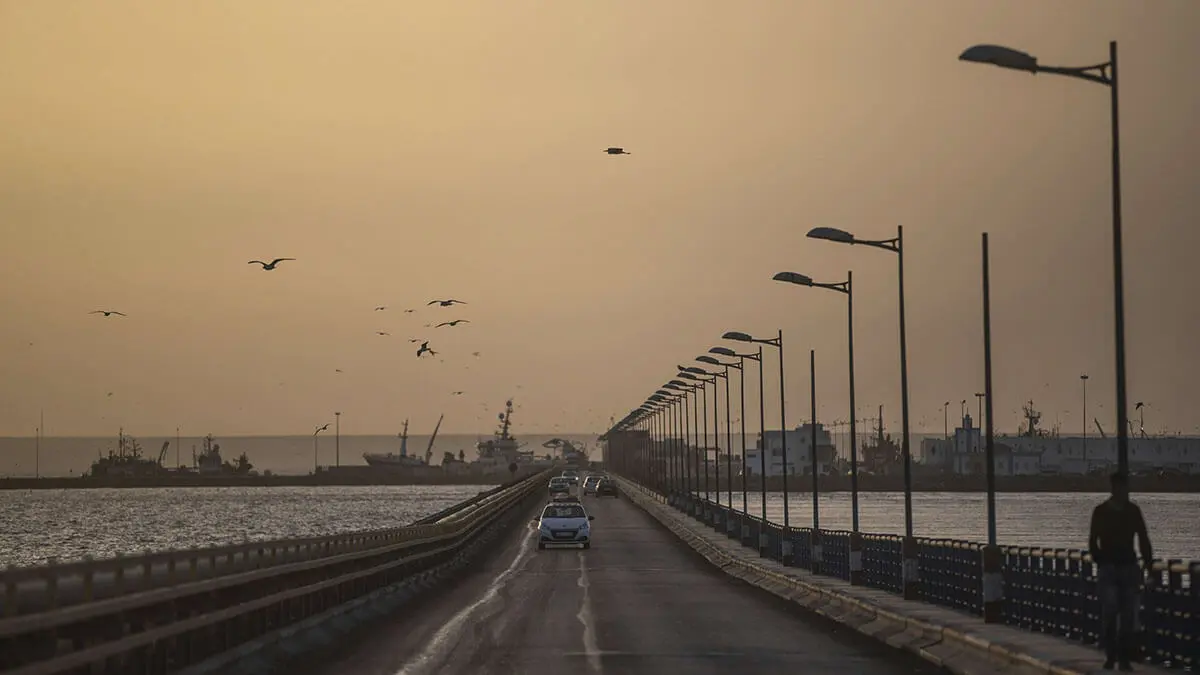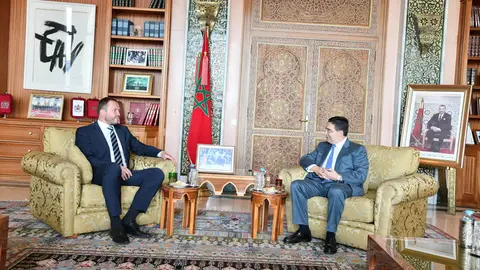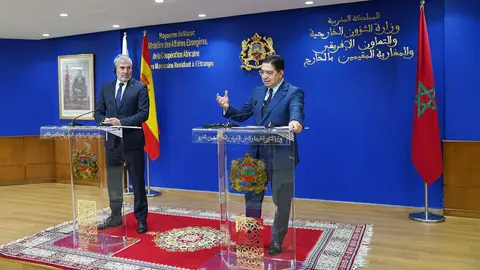A slap in the face for the Canary Islands on the pretext of the Sahara: reply to Antonio Morales Méndez

After reading it, I have decided to give my opinion on some opinions that I consider inopportune, unfortunate, inconsistent and, above all, dangerous for our archipelago.
Mr Morales says that Morocco ‘is far from being a democratic regime’ and, furthermore, that its expansionism directly affects the Canary Islands.
With regard to the Moroccan regime, Morocco is a constitutional democracy where the Parliament and the King divide responsibilities, as happens in semi-presidential systems (Portugal, France, etc.), where the President has a series of responsibilities and others are the responsibility of the Parliament.
Among the King's responsibilities is that of Commander of the Faithful, as is Charles III in the UK, head of the Anglican Church.
Democracies are varied and incomplete even among the most established. Morocco should be compared, above all, with the political systems of its Maghreb neighbours: Algeria, Tunisia, Libya, not with the advanced parliamentary democracies of the first world, even if this is the medium-term goal of Morocco's current political system.
With regard to Moroccan expansionism, I would just remind you, Mr Morales, that Morocco and Ethiopia were the only two independent countries in Africa at the beginning of the 20th century. Morocco was an empire that, according to César Cantú, was lost in the vastness of the Sahara. The map of Greater Morocco attributed to El Fassi, among those held in their chancelleries by the great world powers, are published and easy to consult. The oldest date from the 17th century.
This empire was mutilated, to the south (by Spain) and to the south and east (by France). These mutilations have been recognised as borders by Morocco, both to Mauritania, to Mali and even to Algeria, which took a good chunk of historical Morocco.
However, Morocco never accepted the decolonisation of Spanish Western Sahara and has always claimed it, especially since 1944 at the Tangier and Casablanca conferences, as its own territory.
If we are talking about expansionism, let us look at Algeria, which France recreated at the expense of Tunisia, Libya, Morocco and the Azawag (unredeemed Sahara) by creating the largest state in Africa from an Ottoman protectorate on the Mediterranean coast, and which, not content with this, is seeking an outlet to the Atlantic through a protectorate over Western Sahara with the Polisario Front as its front man.
Likewise, when the African Union dealt with the case of the Canary Islands, brought to Tripoli and Addis Ababa by Algeria, where the decolonisation of the Canary Islands was being discussed, those who defended the Spanish status of our archipelago were Morocco and Senegal. Algeria, at that time, was the winter quarters of Cubillo and ETA.
Mr Morales, when you blame Morocco for the deterioration of the Canary Islands‘ fisheries sector, you forget that, in the Madrid agreements, the right of the Canary Islands’ small-scale fishing fleet to fish on the traditional Canary Islands-Saharan bank was recognised and respected. In a later agreement, at the request of the Spanish side, this unique Canary Island status was sacrificed in exchange for more licences for the cephalopod and sardine fleet.
In any case, the decline of the Canarian fleet began with the assaults on its ships and the death of its sailors. These dead and wounded have never been recognised as victims of terrorism and your party Nueva Canarias has allowed it every time ACAVITE has raised it in the Canarian Parliament. It should be noted that Polisario has never apologised for these murders either.
As for the Spanish financing of the port of Agadir, it deserves no comment, except for the ignorance it represents to raise it as a problem. The same could have been done with our fishing investments in Nouadhibou.
When you talk about agricultural competition between Morocco and the Canaries, I am reminded of the agricultural disputes with the French, before and after our accession to the European Union. The problem with Canary Islands tomatoes is more to do with the operations needed to place them on European markets (five Canary Islands operations against two Moroccan ones) and the cost of seeds, fertilisers, construction and energy for the greenhouses and also, it is true, the differential in the cost of labour. By the way, do you know what percentage of Canary Islanders work in the greenhouses and in the Canarian artisanal fleet? Very few, I am afraid.
Regarding the Exclusive Maritime Economic Zone, it should be pointed out that if Morocco did it unilaterally two years ago, Spain did it, in the same way, much longer ago, with no consequences, since the economic zone must be approved by international organisations, after multilateral deliberations.
In any case, the interests of the Canary Islands would be better defended now in a bilateral negotiation with Morocco, as the status of the Canary Islands' waters would not be certain if the negotiations were protracted. However, today it could be a simple median between the Canary Islands, as a quasi archipelagic state and not as a state archipelago, and the Kingdom of Morocco. Incidentally, I believe that oil prospecting has been carried out by both States, each in its own territorial waters, without any success.
You refer to the violation of human rights. It is true that there have been numerous human rights violations by Morocco, not only in the Sahara, but also in other parts of Morocco. With the reign of Mohammed VI these rights were respected and the errors of the years of lead were corrected by creating a commission of justice and reparation presided over by left-wing reprisals, which publicly studied the damage caused and made judicial and financial reparation.
In the camps, on the other hand, the crimes, persecutions, rapes and abuses that took place, even before the return of the Sahara, have never been acknowledged and which, despite being documented, have always been dismissed by a series of non-governmental organisations and also by political parties such as yours, Nueva Canarias, and by public institutions, town councils and town halls, giving protection and economic aid to recognised criminal defendants.
I recognise that in the past it was more difficult to publicise and prove these human rights violations, as there were no mobile phones to record them. Nowadays, there are many graphic and sound documents that prove it and they cannot be silenced either, calling traitors or sell-outs those who, from the camps or fleeing from them, report and confirm it.
They have not only tried and are trying to silence the indigenous Sahrawis, more than 10,000 of whom have left the camps since 1976, including most of the founding leadership of the Polisario, but also those who, like me, have long been speaking out about the reality of the Moroccan Sahara and the reality of the camps, without forgetting the source of the problem: Algeria.
It is with some embarrassment that I am going to relate something in which I have been an interested party. In January 1992, in a television debate, directed by José Luis Balbín, ‘La Clave’, I was the only one who maintained clear positions against the Polisario Front, although it is true that at the end of the debate some people supported me. From that moment on, several graffiti appeared in Las Palmas insulting me, they threatened my family by telephone and, of course, they accused me of being an agent in the service of Moroccan intelligence.
In 2005, when I spoke at the Fourth Committee of the UN General Assembly and signed as a professor at the university, another campaign was unleashed, similar to the previous one, calling for my dismissal as a professor at the University of Las Palmas de Gran Canaria, and even a discreet investigation was opened in which the rector Manuel Lobo declared that the complaint was unfounded. For some time now, petitioners in the same Commission have been signing as Cabildo Insular de Gran Canaria, without accrediting the mandate, and as far as I know, no investigation has been opened and no one has asked for any responsibility.
On the other hand, the explanations that Mr. Morales asks the president of the Canary Islands, Mr. Clavijo, who, by the way, in my opinion, has done what he had to do and should do, for the good of our islands, should be assumed and carried out by the president of the Cabildo de Gran Canaria, giving an account of all those sectarian acts using the headquarters of the Island Council, with unauthorised symbols and giving unregulated preferential treatment to the Saharawi Arab Democratic Republic (SADR) and the Polisario.
The explanations should focus above all on telling us where the juicy direct financial aid to the camps or related organisations goes directly or indirectly. They should clarify exhaustively how much money was given and what it was used for. What items financed the per diems and allowances for political and labour members of the Cabildo to attend party events under the guise of solidarity with the Sahara.
Returning to the representativeness of the Saharawi people, it must be recognised that the latest ruling of the European Court of Justice gives the Polisario an aliquot part of that representativeness and not the one claimed by the Polisario, as the sole and legitimate representative of the Saharawi people. The Saharawi people is represented at least by the following positions:
Firstly, those who continue to live since the origin of the conflict in the former Western Sahara, now Moroccan Sahara (more than 70% of the Spanish census of 1974) and those who have joined the territory from the camps (more than 10,000 between 1977 and today). We can say that around 80% of those recognised in the Spanish census or their descendants are currently living in the Moroccan Sahara, participating in all political, administrative and electoral activities without any discrimination whatsoever.
Secondly, those who live in the Hamada camps in Tindouf and who are no longer represented solely by the Polisario, but by other positions such as that of the MSP (Sahrawi Movement for Peace), which presents different alternatives for resolving the conflict. They never reached 20,000 displaced persons (27% of the Spanish census) and currently number less than 16,000. All of them have no international UNHCR registration, no documentation, no rights, and cannot leave the camps without an accreditation from the Polisario and another from Algeria to document their departure abroad.
Most of them are hostages rather than refugees. Here I agree with Mr Morales, there are the greatest violations of human rights, on the Polisario and Algerian sides, and Morocco is open to receive them, as it has been doing from the beginning.
Thirdly, there are those living outside the camps and the Moroccan Sahara, scattered over several continents, and in particular settled in Mauritania, who can be grouped in one of the two previous positions, or take any other position (I estimate around 5,000).
In conclusion, I would like to say that the Moroccan ownership of the Sahara is an indisputable fact, widely accepted by the international community, as demonstrated by the opening of 32 Consulates General in Laayoune and Dakhla, and the explicit support of more than 115 countries for the autonomy initiative under Moroccan sovereignty as the only solution to this regional dispute.
At the same time, the majority of UN member states do not recognise SADR and support the political process under the exclusive aegis of the UN as the only way to reach a definitive political solution to the regional dispute over the Sahara.
In this regard, I would like to stress that SADR is nothing more than an emanation of Algeria's geopolitical interests and hegemonic agenda. It has no territory of its own, the population is artificially inflated and the government is nothing more than a puppet of the host country. As we have said before, the vast majority of the Sahrawi population lives in the Moroccan Sahara.
Finally, Algeria's obstinacy in refusing to engage in good faith in the political process is delaying the final settlement of the regional dispute over the Moroccan Sahara, holding the majority of the inhabitants of the Tindouf camps hostage and mortgaging the future of the peoples of the region. It is preventing the construction of the great Arab Maghreb, which is so important for the well-being of the North African peoples, the European Union and, ultimately, humanity.
Rafael Esparza Machín, expert on the Maghreb.



